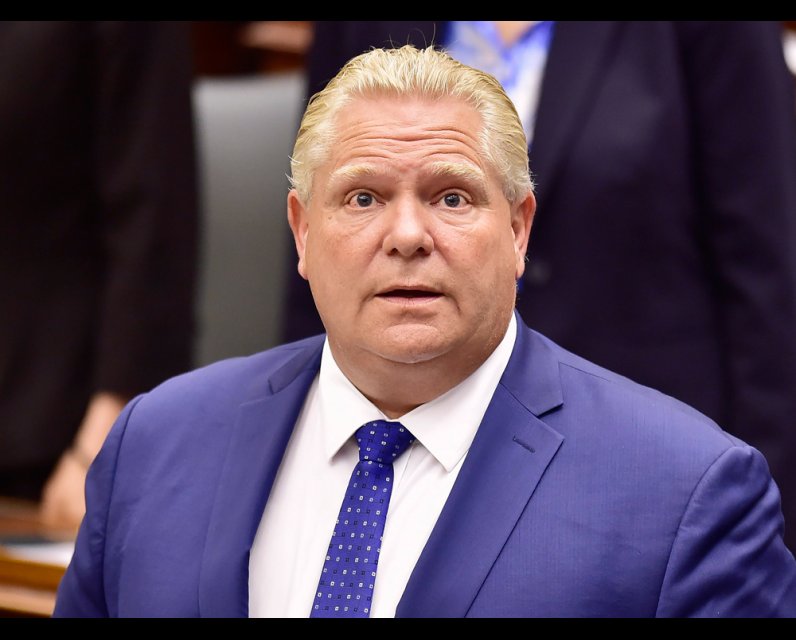Unpublished Opinions
Syndicated #cdntech #cdnpoli #onpoli blogger. Cutting out the political spin to get the info that matters. Retired EDM DJ. Father to a son with autism.
Twitter: @jkobopoli
Contact E-mail: jkobopoli at rogers dot com
Doug Ford's Civil Rights Crisis Pt. 2

Authorized by: Jason Koblovsky
Read Part I >> https://unpublishedottawa.com/letter/241454/doug-ford%E2%80%99s-civil-rights-crisis-part-1
Expect four long years if you don’t support the autism changes. Don’t listen to dissolute parents, they are professional protesters. If you give them [parents/caregivers] an inch they will ask for a mile. They all have their hands in the public trough. Be very, very careful. I hope all your children all die under Ford. Show up at my office I’m calling the police. What do these statements have in common? Over the past few months they have all been directed to parents/caregivers/support workers of extremely vulnerable children from Ontario policy makers, cabinet ministers, even from Premier Doug Ford himself.
Since my last blog, there was an internal report that was released on autism that stated the province intentionally lied on the number of children on the wait list, and that government's current plan would leave families “destitute”. Premier Ford was recently asked about this report on 640am Toronto. You can listen to his response below.
https://soundcloud.com/user-530238113/ford-autism-report-interview
Ford basically stated that the province didn’t lie on the numbers, and that this report is from only one person. He kept deflecting questions relating to this internal report to an expert committee the province has set up. Remember in my opening that “I hope your children all die under Ford” comment. That comes from Alex Echakowitz who sits on the panel of experts that Ford is deflecting too.
There was a recent attempt by the Ford Government to legislate itself out of being sued as a result of crown ministers who are acting in bad faith or acting indecently by introducing sweeping changes to crown liability in the Crown Liability and Proceedings Act as discussed in part 1 of this blog and passed in Ontario’s budget implementation bill in April. I caught up with the Director of Fundamental Freedoms at the Canadian Civil Liberties Association (CCLA) Cara Zwibel to discuss these legislative changes. Zwibel stated that governments are typically considered immune on policy but not operational issues.
A policy matter would be like changes to the Autism Program. Operational issues could be things like responding inappropriately to the public, lack of information from a Ministry, withholding funds, and organizational issues that sort of thing. As far as the CCLA is concerned Zwibel said:
For as long as there has been crown liability, there’s been this distinction between liability for policy matters and liability for operational matters. The courts have generally said that the crown is not liable for policy matters, but may be liable for negligence in operational matters. What I think this new law is trying to do is call a bunch of things we would usually characterize as operational, and deem them to be policy, thus immunizing the Crown from liability.
Zwibel stated that the definition of operational and policy issues can also be defined almost in real time by way of regulation and the government could apply this retroactively. “Basically without making an amendment to the legislation, the government can just pass a regulation that calls something a policy matter or a regulatory decision and give itself immunity.” Zwibel said.
What this could mean is that if someone were to sue the Ontario government, the government could basically regulate itself out of a law suit without it ever being heard in a court room. When asked about the prospect of another Walkerton style tragedy, Zwibel did state that in some cases this legislation may not apply as a result of it being a federal charter issue, however it would make the cases that are not charter based a lot harder and the Crown Liability and Proceedings Act adds significant hurdles to claimants going forward. Zwibel explains:
One of the particular parts of this legislation is that it sets a barrier for people who want to make a claim that the government engaged in misfeasance or bad faith. The way the act is written for these types of claims you would need the court’s permission to continue. In order to get that permission you’re going to have to do a bunch of disclosure and be subjected to cross –examination and the government really doesn’t have to do anything.
Basically this legislation makes it virtually impossible to prove government acted in bad faith or indecency. Those that do bring cases like this forward have to jump through a whole bunch of hoops, with all their cards laid on the table for government to fully see and cross-examine. The government on the other hand doesn’t have to produce anything from its side to the claimants in the process.
While the Crown Liability and Proceedings Act has not been proclaimed meaning it isn’t in full force as of yet, Zwibel stated that the CCLA stands ready to intervene and make its arguments against this legislation in court when the government “activates it”. Zwibel said that the CCLA is deeply troubled with the fact that legislation dealing with government accountability was tabled in the budget bill, and not given proper time for public debate and scrutiny.
Since this legislation was birthed when Caroline Mulroney was the Attorney General, I’ve requested comment from Mulroney’s office, and Ms. Mulroney has not answered request for comment prior to a 5pm deadline yesterday.
For the autism community however, the threatening tone and nature of government communications towards “destitute” families and current policy changes as a result; are increasingly looking like they have run a foul to the Federal Canadian Charter of Rights and Freedoms. Families should start to assert their legal rights on a government that seems hell bent on making itself immune to not just bad behaviour from government ministers and staff, but willing and able to threaten to silence dissenters as well.
UPDATE 6:32 PM: Caroline Mulroney's office has responded to request for comment and disputes concerns the CCLA and this blog have expressed. A spokesperson for Mulroney offered this comment (emphasis added):
What these changes accomplish is to ensure that the government can make good faith legislative, regulatory and policy decisions without fear of being sued for negligence claims that lack merit, and to ensure that the courts are not evaluating the legislative, regulatory or policy decisions of a government – that is what the ballot box is for.
People can always sue in Ontario’s courts to receive the justice they deserve. It should be noted that disputes involving contracts, constitutional issues, human rights and judicial review of government decisions are not impacted by these changes at all, and the government would remain liable for the day-to-day, operational negligence of its front line employees if proven in court.
Under the current system, well-funded lawyers are constantly bringing expensive lawsuits over principles of law long settled by the Supreme Court of Canada. The government spends tens of millions of taxpayers dollars every year on litigation lawyers. Each dollar spent defending against a frivolous lawsuit brought by an expensive lawyer is a dollar that could have gone to services like healthcare or education.
I guess ministers of the crown are free to do as they please until election day. Somehow I can't see the courts agreeing with that.



Comments
Be the first to comment